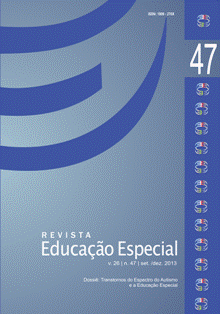EARLY DISTANCE INTERVENTION AND FOLLOW-UP FOR FAMILIES OF INFANTS AND TODDLERS AT RISK FOR DEVELOPMENTAL DISABILITIES AND SEVERE BEHAVIOR PROBLEMS IN PERU
DOI:
https://doi.org/10.5902/1984686X9946Parole chiave:
Early distance intervention, Serious aggression, Autoaggression and stereotyped behavior, Infants and toddlers at risk, Workshops and follow-up by phone, Peru.Abstract
http://dx.doi.org/10.5902/1984686X9946
A major barrier to meeting the needs of low-income children and families with disabilities is distance from a center providing the diagnostics and treatment. In the U.S. several innovative ways of overcoming this difficulty have emerged, e.g. Call-In, Come-In Services in a Pediatric Psychology Practice, diagnostics and consultation via telemedicine, use of the Internet for webcasting conferences, library resources over the Internet, etc. These services are not yet available in many developing countries or in rural areas of the U.S., however. We report below an inexpensive and effective method of early distance intervention using workshops every two months and monthly telephone follow-up at the Centro Ann Sullivan del Peru in Lima, Peru. While many poor families may not have regular access to radio, television, or the Internet, we and others (Bigelow, Carta, & LeFever, 2008) have found that almost all have cell phones, and they can be followed regularly.
In our project on early prevention of severe aggression, self-injury, and stereotyped behavior among infants and toddlers at risk for developmental disabilities, monthly telephone follow-up attendance remained high throughout the one-year follow-up period (92%), while family attendance at the six bi-monthly workshops dropped off (75% to 28%). Mean BPI frequency scores decreased significantly over the year. BPI scores were significantly higher, and they decreased more in the high-attendance group than in the low-attendance group. Family stress was reduced by 65%. Consumer satisfaction was 98%.
A very similar workshop package has been given to many orphanages and to remote areas in Peru, where there is not any kind of education about disabilities and where parents have to be the best teachers. Having such tools gives them knowledge of what their children can achieve, so they would not relinquish them to government orphanages.
Downloads
##submission.downloads##
Pubblicato
Come citare
Fascicolo
Sezione
Licenza

This work is licensed under a Creative Commons Attribution-NonCommercial 4.0 International (CC BY-NC 4.0)
DECLARAÇÃO DE ORIGINALIDADE E DIREITOS AUTORAIS
Declaramos o artigo a ser submetido para avaliação na Revista Educação Especial (UFSM) é original e inédito, assim como não foi enviado para qualquer outra publicação, como um todo ou uma fração.
Também reconhecemos que a submissão dos originais à Revista Educação Especial (UFSM) implica na transferência de direitos autorais para publicação digital na revista. Em caso de incumprimento, o infrator receberá sanções e penalidades previstas pela Lei Brasileira de Proteção de Direitos Autorais (n. 9610, de 19/02/98).







